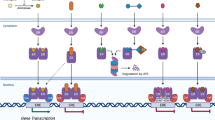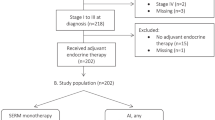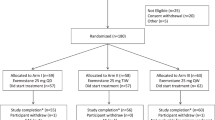Abstract
Anastrozole is the first aromatase inhibitor to show a significant survival advantage over megestrol acetate in post-menopausal women with advanced breast cancer. The rationale for extending the use of aromatase inhibitors to the treatment of early breast cancer is based on the efficacy observed in the advanced setting, combined with good tolerability and a convenient dosing regimen. Furthermore, oestrogen deprivation by ovarian ablation (similar to oestrogen antagonism with tamoxifen) is already established as an effective adjuvant treatment in premenopausal women with modality breast cancer. Anastrozole produces a profound suppression of plasma oestrogen levels which is greater than that obtained with earlier aromatase inhibitors (formestane, aminoglutethimide) or megestrol acetate. This could account for the differences in clinical efficacy seen between anastrozole and megestrol acetate. In terms of benefits over other endocrine agents, anastrozole causes significantly less weight gain than megestrol acetate; it does not have the partial agonist activity of tamoxifen, and is unlikely to lead to tumour stimulation in patients resistant to tamoxifen or to exert proliferative effects on the endometrium. The lack of oestrogen agonist activity, however, may possibly have detrimental effects on bone mineral density and blood lipid profile. Current clinical trials are investigating the efficacy and safety of anastrozole in the early breast cancer setting. The results of these trials will help to determine whether anastrozole has any benefits over tamoxifen, the current treatment of choice in post-menopausal women with early breast cancer.
This is a preview of subscription content, access via your institution
Access options
Subscribe to this journal
Receive 24 print issues and online access
$259.00 per year
only $10.79 per issue
Buy this article
- Purchase on Springer Link
- Instant access to full article PDF
Prices may be subject to local taxes which are calculated during checkout
Similar content being viewed by others
Author information
Authors and Affiliations
Rights and permissions
About this article
Cite this article
Lønning, P. Aromatase inhibitors and their future role in post-menopausal women with early breast cancer. Br J Cancer 78 (Suppl 4), 12–15 (1998). https://doi.org/10.1038/bjc.1998.756
Issue Date:
DOI: https://doi.org/10.1038/bjc.1998.756
This article is cited by
-
Aromatase and aromatase inhibitors
Breast Cancer (2001)
-
Current status and controversial issues concerning endocrine therapy for patients with recurrent breast cancer in Japan
Breast Cancer (1999)



